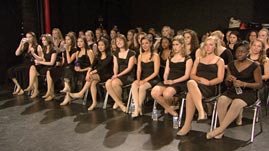Here are suggested ways to engage students with this video and with activities related to this topic.
- One of the performers says that for her, stage fright is “unchanneled energy.” Ask students to discuss how they might rechannel their energy from stage fright.
- Use the following exercise to help students understand how focusing on a task will lessen stage fright. Ask half the class to stand up in front of the other students, who should remain seated (as if they were the audience, watching performers). Let the standing group remain in place, with nothing to do, for up to four minutes. Then whisper instructions to each of the standing students to count the number of chairs in the room. (Only the student receiving the instructions should be able to hear them.) Let the activity run a minute or so more and then let the group sit. Ask a member of the standing group to explain what happened after he or she carried out the instructions. Did that student feel less nervous? Ask students to discuss how focusing on a task or knowing what they are doing on stage might help them deal with nerves while they are performing.
- Ask students to remember performances when they were the most or the least nervous. What do they think made the difference? Are there lessons to learn from these experiences?
- Ask students what it means to them personally to be completely prepared for a performance. How do they know they are completely ready, and how does knowing they are ready make them feel? You may begin by asking students to call out five words that describe what being prepared means to them and recording the words on the board.



 Loading Standards
Loading Standards